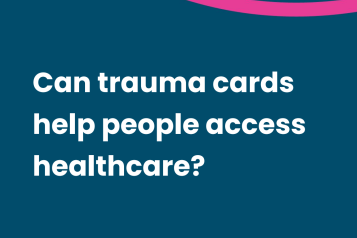How your views have helped improve mental health support for future mums

The arrival of a new baby is a major life event for any family. It can be joyful, exciting, overwhelming and challenging all at once. As well as the expected ups and downs connected with becoming a parent, many people experience mental health problems too.
- One in four women have a mental health problem in pregnancy and during the 24 months after giving birth.
- The most common mental health problems experienced during pregnancy and after birth are anxiety, depression and post-traumatic stress disorder.
- In the UK, maternal suicide is the leading cause of direct deaths occurring within a year after the end of pregnancy.
Last September, we shared the experiences of 1,738 women in our report Mental health and the journey to parenthood to show what was working and what was not when it came to mental health support for new parents.
Our findings echoed previous research, highlighting that while many women report good experiences of care, support is variable and does not consistently meet NICE national guidelines for what women should expect when it comes to the recognition, assessment and treatment of mental health problems during and after pregnancy.
The wide range of experiences women shared with us also highlighted how unique each person’s journey to becoming a parent can be and how important it is that the support made available meets their individual needs.
Find out more by reading our full report
What would help?
Expectant and new parents interact with a variety of professionals and told us they would like more chances to discuss their mental wellbeing.
Our report therefore recommended creating more opportunities for women to talk about their mental health and supported the call by NCT and other organisations for the NHS to introduce a postnatal six-week health check for mothers.
How have your views improved care?
In February 2020, NHS England announced that from April all women in England who have a baby will have a six-week assessment of their wellbeing. This will include a focus on identifying mental health issues. To fund the initiative, NHS England has agreed to provide £12 million in funding to GPs, as part of a new five-year contract.
We want to thank everyone who shared their experience of mental health services either with us or other organisations working to improve mental health support for new parents.
Your views have highlighted that most women do not have a postnatal check, or only have a very brief one during their baby’s six-week check-up appointment, often because of time pressures. The introduction of a new six-week wellbeing check will give more space for new mothers to raise issues about their own health and help to ensure mental health problems are spotted by professionals.
Without new parents speaking up about the changes they want to see, improvements like this wouldn’t happen.
What still needs to happen?
Providing support for mums is an important first step, but the NHS needs to do more for partners to ensure the whole family is supported. Currently, unless the mum is experiencing mental health problems, partners can only access traditional non-specialised talking therapies, even if the trigger for their poor mental health is becoming a new parent.
We also know that the new six-week wellbeing check won’t solve all the current inconsistencies in maternal mental health care overnight. This is why it’s vital that new parents keep sharing their experiences of services and support, to make sure improvements in care continue to take place.
Have you been affected by this article?
If the content of this article causes you to think of anything that has happened to you or someone you know and you feel upset, worried or uncomfortable, please see the Maternal Mental Health Alliance’s support page for a list of services who may be able to help.


